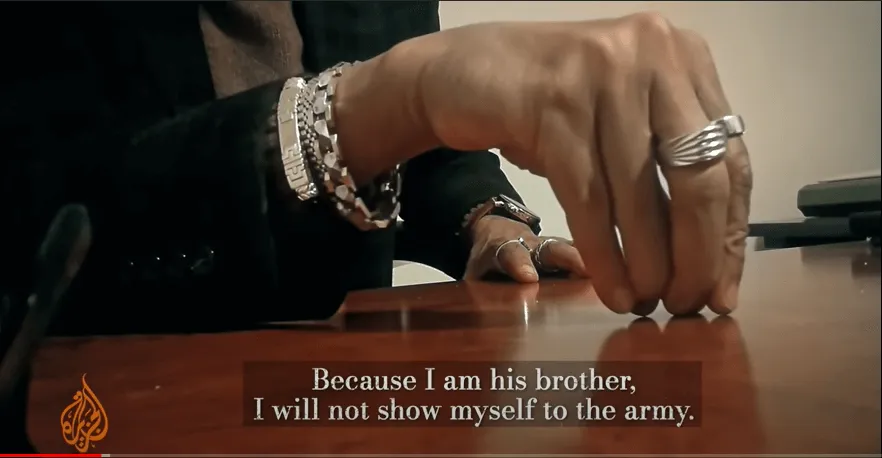In All the Prime Minister’s Men, an explosive 2021 documentary, Al Jazeera revealed the closed ties between the Bangladeshi Prime Minister and a former street mafia currently involved in corrupt activities and money laundering. Aziz Ahmed, the Chief of Army Staff, has extorted bribes in exchange for job positions and contracts. He has protected his brothers and accomplices - Haris, who fled a murder conviction and now serves as middleman in these contract agreements - and Anis. Shockingly, this documentary showcased evidence that Haris’ role as a middleman is actually sanctioned by Prime Minister Sheikh Hasina.
In 1975, Sheikh Mujibur Rahman abolished the opposition party. The army staged a coup, murdering Sheikh Mujibur and members of his family. Hasina served as opposition leader at the time, head of the Awami League party. The Ahmed clan were a group of crime bosses who effectively controlled parts of the country, killed people, and extorted businesses. Haris Ahmed joined Sheikh Jasina’s team as a bodyguard before facing charges of murdering a political rival.
After that, Haris fled to Hungary and changed his identity to “Mohammad Hasan,” and Anis to Malaysia. Back in Bangladesh, the brothers continued to receive protection from the Bangladeshi state. Mohammed Hasan’s identity was confirmed by his brother Aziz, giving the state no reason to doubt the authenticity of his documents. This web of corruption extends to police officers, some of whom are paid a cut of the money involved.
After Hasina won the 2014 elections, the documentary reveals that Haris secretly controlled a company based in Hungary, and collaborated with Aziz to obtain state contracts. They also engaged in the indirect buying of surveillance equipment from Israel, with which Bangladesh has no formal diplomatic ties. In fact, the documentary uncovered undercovering training of Bangladeshi officers by Israelis in Budapest. This raises further red flags about the state of surveillance by the Bangladeshi government on its own citizens.
Soon after the documentary’s release on YouTube, millions of Bangladeshis watched and shared it on social media. Many human rights groups have urged the UN to review its relations with Bangladeshi armed forces. In fact, Aziz Ahmed is closely involved with a number of UN peacekeeping missions worldwide. The Bangladeshi government has completely denied these allegations and called the documentary “a politically motivated smear campaign by notorious individuals associated with the Jamaat-e-Islami extremist group.” Supporters of Sheikh Hasina have called it “a hit job on the Awami League,” and a lawyer affiliated with the government filed a sedition case.

Meanwhile, mainstream media was silent. As Dhaka-based journalist Faisal Mahmud noted, journalists who have been critical of the state have repeatedly been accused of defamation and sent to jail, with intimidation and threats being used to silence independent media. “Digital security laws” purportedly meant to enforce national security have been used as justifications to throw writers in jail and suppress dissent. Amnesty International states that this law is “plagued by a lack of clear definitions, explanations, and exceptions, including repressive non-bailable penalties for at least 14 offenses.”
One such writer was Mushtaq Ahmed. As of the first week of March, hundreds of Bangladeshis have protested his untimely death in jail, and have been met with rubber bullets and tear gas. Hasina has not responded to international outcry on the security laws that contributed to his detention and ultimately death. According to a spokesperson from the opposition Bangladesh national Party, “It is a murder… we think the state is involved.” Hasina merely commented, “What can we do if someone dies falling sick in jail?”
Ahmed had been detained along with political cartoonist Kishore Kabir since May 2020, after criticizing the government’s response to Covid-19 on Facebook. Kabir’s lawyer confirmed that Kabir had been brutally tortured, leaving his eardrum ruptured and his ankle injured. Again, these claims have been overtly denied by the state. Thirteen OECD ambassadors and high commissioners issued a joint statement urging a “swift, transparent, and independent inquiry” into the circumstances of Ahmed’s death.
According to the Global Corruption Perception Index 2020 released by Transparency International, Bangladesh ranks at 146 out of 180 countries. The findings of this documentary throw even more concern on the corruption issue, as well as potential backdoor dealings with Israel. The total lack of response or investigation from the Bangladeshi state raises immense cause for concern. Furthermore, Mushtaq Ahmed’s death in state custody is unacceptable, and the detention of journalists under the opaque digital security law is totally unacceptable. International human rights groups and governments worldwide must call out such flagrant human rights abuses and thoroughly investigate the corruption exposed by the documentary. Unfettered access to the Internet and social media and the rights of protestors must be protected as Bangladeshis share and discuss these explosive findings and work to hold the government fully accountable to the people.







We respect your freedom of speech.
Please don't write anything that might violate someone else's privacy.